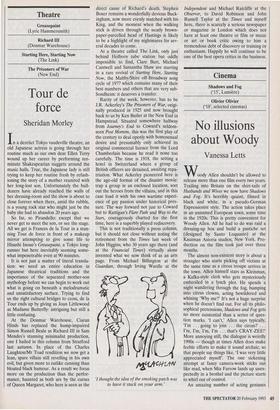Theatre
Greasepaint (Lyric Hammersmith) Richard III (Donmar Warehouse) Starting Here, Starting Now (The Link) The Prisoners of War (New End)
Tour de force
Sheridan Morley
In a derelict Tokyo vaudeville theatre, an old Japanese actress is going through her routine much as our own dear Ellen Terry wound up her career by performing ten- minute Shakespearian nuggets around the music halls. True, the Japanese lady is still trying to keep her routine fresh by refash- ioning the story of a mother reunited with her long-lost son. Unfortunately the bull- dozers have already reached the walls of her dressing-room and the show is about to close forever when there, amid the rubble, is a young rock star who might just be the baby she had to abandon 20 years ago.
So far, so Pirandello: except that we never get to meet the son, or see the stage. All we get is Frances de la Tour in a stun- ning Tour de force in front of a makeup mirror attempting to give some life to Hisashi Inoue's Greasepaint, a Tokyo long- runner but here inevitably seeming some- what impenetrable even at 90 minutes.
It is not just a matter of literal transla- tion: we need an entire education in Japanese theatrical traditions and the importance of the separated mother-son mythology before we can begin to work out what is going on beneath a melodramatic and unsatisfactory surface. Trying to find us the right cultural bridges to cross, de la Tour ends up by giving us Joan Littlewood as Madame Butterfly: intriguing but still a little confusing.
At the Donmar Warehouse, Ciaran Hinds has replaced the hump-impaired Simon Russell Beale as Richard III in Sam Mendes's stunning minimalist production, one I hailed in this column from Stratford last autumn. In place of the Charles Laughton/Mr Toad rendition we now get a lean, spare villain still revelling in his own evil, but given more to ratlike cunning than bloated black humour. As a result we focus more on the production than the perfor- mance, haunted as both are by the curses of Queen Margaret, who here is seen as the
direct cause of Richard's death. Stephen Boxer remains a wonderfully devious Buck- ingham, now more evenly matched with his King, and the moment when the walking stick is driven through the neatly brown- paper-parcelled head of Hastings is likely to be a highlight of my nightmares for sev- eral decades to come.
At a theatre called The Link, only just behind Holborn tube station but oddly impossible to find, Clare Burt, Michael Cantwell and Samantha Shaw are starring in a rare revival of Starting Here, Starting Now, the Maltby/Shire off-Broadway song cycle of 1977 which contains many of their best numbers and others that are very sub- Sondheim: it deserves a transfer.
Rarity of the week, however, has to be J.R. Ackerley's The Prisoners of War, origi- nally produced in 1925 and now brought back to us by Ken Butler at the New End in Hampstead. Situated somewhere halfway from Journey's End to Coward's seldom- seen Post Mortem, this was the first play of the century to deal openly with homosexual desire and presumably only achieved its original commercial licence from the Lord Chamberlain because he read it none too carefully. The time is 1918, the setting a hotel in Switzerland where a group of British officers are detained, awaiting repa- triation. What Ackerley pioneered here is the age-old format of the disaster movie: trap a group in an enclosed location, sort out the heroes from the villains, and in this case load it with his own wartime experi- ence of gay passion under historical pres- sure. The way forward not just to Coward but to Rattigan's Flare Path and Way to the Stars, courageously charted for the first time, here is a superbly played rediscovery.
This is not traditionally a press column, but it should not close without noting the retirement from the Times last week of John Higgins, who 30 years ago there (and at the Financial Times) virtually alone invented what we now think of as an arts page. From Michael Billington at the Guardian, through Irving Wardle at the `I thought the idea of the smoking patch was to have it stuck on your arm.' Independent and Michael Ratcliffe at the Observer, to David Robinson and John Russell Taylor at the Times and myself here, there is scarcely a serious newspaper or magazine in London which does not have at least one theatre or film or music or art or book critic owing to him a tremendous debt of discovery or training or enthusiasm. Happily he will continue to be one of the best opera critics in the business.


























































 Previous page
Previous page